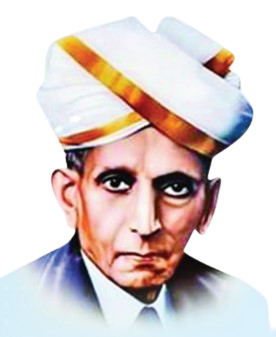ABOUT CIVIL ENGINEERING DEPARTMENT

Sir Mokshagundam Visvesvaraya who is often referred by his initials MV, was India's first Civil Engineer, Statesman, and the 19th Diwan of Mysore who served the position from 1912 to 1918. The birth anniversary of Mokshagundam Visvesvaraya on September 15 is celebrated as Engineers Day in India to honour and acknowledge his work for the development of the country. Notably, Mokshagundam Visvesvaraya was the Chief Engineer of Krishna Raja Sagara Dam in the North-West suburb of Mysuru City and also worked as the Chief engineer of the flood protection system for Hyderabad.
The Department of Civil Engineering was established in the year 2009, with an annual intake of 60 students for B.Tech. At present the Department intake for undergraduate (B.Tech.) is 30. The professional discipline of civil engineering is concerned with the planning, building, and upkeep of the naturally occurring built environment. The department's main goals are to establish itself as a leader in the field of civil engineering and produce exceptional engineers by utilizing cutting-edge teaching methods and resources for undergraduate students.
Our department's primary objective is to provide students with the knowledge and skills required to develop creative, safe, environmentally responsible civil engineering structures that are of adequate quality to compete with tomorrow's technologies on a worldwide scale. Field trips to factories, irrigation dams, building sites, etc., provide students with real-world experience. The department gives the students the ideal setting to prepare them for a demanding future. Pupils are trained in interpersonal skills as well as technical knowledge, which is essential for success in the modern world.
The Civil Department is well equipped with spacious laboratories and experienced technicians. For the comprehensive development of civil engineering students, the department hosts expert lectures, group discussions, competitions, and other events under the guidance of these recognized professional groups. The department encourages students to get involved in extracurricular activities, sports, the NCC, blood donation, and other college-related events.
VISION
The department aims to become a top civil engineering department, producing technically proficient, globally feasible individuals capable of addressing social issues through long-term solutions
MISSION
Delivering industry-relevant civil engineering knowledge through innovative teaching methods and advanced technology.
Providing students with the best learning resources and practical use of modern tools and encouraging soft skills.
Creating a supportive environment for students to become top academics, professionals, inventors, and business owners
PEOs for Civil Engineering B.Tech
PEO 1: The goal is to understand fundamental and applied mathematical, scientific, and engineering principles to analyse complex engineering problems, meet national and international requirements, and promote sustainable development.
PEO 2: The goal is to utilize modern engineering tools for planning, analysis, design, and implementation of analytical data, while evaluating their relevance in societal and legal issues.
PEO 3: The goal is to maintain professionalism, ethical conduct, effective communication, managerial skills, teamwork, and social responsibility in their profession, while continuously learning and adapting to current trends.
PSOs for Civil Engineering B. Tech
PSO 1: Graduates will possess the skills to design various civil structures such as buildings, roads, bridges, and hydraulic structures.
PSO 2: Graduates will possess the knowledge to Understand the materials and processes involved in various civil engineering domains through the application of codes of practices.
PROGRAM OUTCOMES (POs)
Engineering knowledge: Apply the knowledge of mathematics, science, engineering fundamentals, and an engineering specialization to the solution of complex engineering problems.
Problem analysis: Identify, formulate, review research literature, and analyse complex engineering problems reaching substantiated conclusions using first principles of mathematics, natural sciences, and engineering sciences.
Design/development of solutions: Design solutions for complex engineering problems and design system components or processes that meet the specified needs with appropriate consideration for the public health and safety, and the cultural, societal, and environmental considerations.
Conduct investigations of complex problems: Use research-based knowledge and research methods including design of experiments, analysis and interpretation of data, and synthesis of the information to provide valid conclusions.
Modern tool usage: Create, select, and apply appropriate techniques, resources, and modern engineering and IT tools including prediction and modelling to complex engineering activities with an understanding of the limitations.
The engineer and society: Apply reasoning informed by the contextual knowledge to assess societal, health, safety, legal and cultural issues and the consequent responsibilities relevant to the professional engineering practice.
Environment and sustainability: Understand the impact of the professional engineering solutions in societal and environmental contexts, and demonstrate the knowledge of, and need for sustainable development.
Ethics: Apply ethical principles and commit to professional ethics and responsibilities and norms of the engineering practice.
Individual and team work:Function effectively as an individual, and as a member or leader in diverse teams, and in multidisciplinary settings.
Communication:Communicate effectively on complex engineering activities with the engineering community and with society at large, such as, being able to comprehend and write effective reports and design documentation, make effective presentations, and give and receive clear instructions.
Project management and finance: Demonstrate knowledge and understanding of the engineering and management principles and apply these to one's own work, as a member and leader in a team, to manage projects and in multidisciplinary environments.
Life-long learning:Recognize the need for, and have the preparation and ability to engage in independent and life-long learning in the broadest context of technological change.
Comming Soon...
